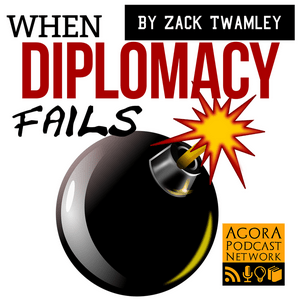744 Episoden

Goodbye For Now
06.10.2025 | 14 Min.
Between working full time and the impending arrival of baby WDF, I would be lying if I pretended as if nothing was going to change. It is, in fact, time to accept that I am only one man. But that's okay, because soon this man will be a daddy! A huge thanksss to you for sticking with the show, and although I cannot say when I'll be back, I promise you I will be...soon. Hosted on Acast. See acast.com/privacy for more information.

#70: July Crisis Q&A
30.7.2025 | 58 Min.
During this series we have encountered a wide variety of fascinating characters and controversial decisions, but even though the story of why the world went to war in 1914 is finally finished, that doesn't mean we covered everything. After over a year of content, I felt it was only right to turn the mic over to you. What still leaves you puzzled? What do you think deserves more attention? What part of the story did I miss? What decision needs more explanation? Here, I delve into the questions you sent me over the last few weeks, and we bring this series to its deserved end. Thanksss so much for your questions, not to mention your support and attention, you're the best history friends a podcaster could ask for! Hosted on Acast. See acast.com/privacy for more information.

State of the Podcast Address 21 July 2025
21.7.2025 | 29 Min.
It's been a while since I last checked in with you, and I've been sitting on some incredible news for a while now. If you'd like to know how things are about to change, then make sure you listen in! Hosted on Acast. See acast.com/privacy for more information.

#69: The First World War - Whose Fault Is It Anyway? Part 3
21.7.2025 | 49 Min.
In our final part, we bring this saga of a series to an end by focusing our attention on the most focused on country of all - Germany. We know what Germany did from 1 August, from the declarations of war to the rape of Belgium, but what about before? What about the period 29-30 July, when the war truly became inevitable? Would it surprise you to learn that the Germans were the ones attempting to pull back from ledge?For a preciously brief period of time, Berlin was flying the flag for peace, even if they did so with insufficient skill and far too late. Germany's sins were many, but she was among good company. As we conclude here, none of the three eastern powers emerges without fault, but what does this mean for our understanding of the July Crisis? How does it change our view of the First World War? Join me here to find out, as I propose an alarmingly simple yet nuanced way of looking at this overwritten story. Thanksss so much for joining for the ride.Send your questions to our Q&A on the July Crisis!You can also send them through Facebook! Hosted on Acast. See acast.com/privacy for more information.

#68: The First World War - Whose Fault Is It Anyway? Part 2
14.7.2025 | 37 Min.
For generations, examinations of the First World War excluded arguably the most important actor - Russia. In this episode, we will hone in on the Tsar's court and his ministers. We will analyse their mindset at crucial moments in the crisis, particularly the 29-30 July, where general mobilisation was approved against Austria and Germany. What was the meaning of this act? Was it based on sound logic, or something more problematic, and did this act mean that Russia - rather than Germany - was mostly responsible for what followed? Listen in to find out history friend!Make sure you visit our Q&A, to have your say on any questions you want answered on the July Crisis! Hosted on Acast. See acast.com/privacy for more information.
Weitere Geschichte Podcasts
Trending Geschichte Podcasts
Über When Diplomacy Fails Podcast
Höre When Diplomacy Fails Podcast, Was bisher geschah - Geschichtspodcast und viele andere Podcasts aus aller Welt mit der radio.at-App

Hol dir die kostenlose radio.at App
- Sender und Podcasts favorisieren
- Streamen via Wifi oder Bluetooth
- Unterstützt Carplay & Android Auto
- viele weitere App Funktionen
Hol dir die kostenlose radio.at App
- Sender und Podcasts favorisieren
- Streamen via Wifi oder Bluetooth
- Unterstützt Carplay & Android Auto
- viele weitere App Funktionen


When Diplomacy Fails Podcast
App laden,
loshören.




































